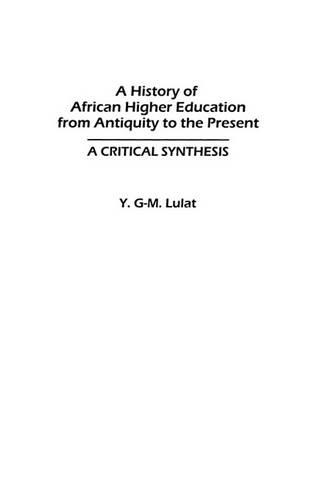
A History of African Higher Education from Antiquity to the Present: A Critical Synthesis
(Hardback)
Publishing Details
A History of African Higher Education from Antiquity to the Present: A Critical Synthesis
By (Author) Y. G-M Lulat
Bloomsbury Publishing PLC
Praeger Publishers Inc
30th August 2005
United States
Classifications
Professional and Scholarly
Non Fiction
African history
378.6
Physical Properties
Hardback
638
Width 156mm, Height 235mm
1106g
Description
This book surveys the history of higher educationprincipally universitiesin Africa. Its geographical coverage encompasses the entire continent, from Afro-Arab Islamic Africa in the north to the former apartheid South Africa in the south, and the historical time span ranges from the Egyptian civilization to the present. Since little has been written on this topic, particularly its historical component, the work fills an important gap in the literature. The book delineates the broad contours of the history of higher education in Africa in exceptional historical breadth, voluminously documenting its subject in the text, detailed footnotes, and lengthy appendices. Its methodological approach is that of critical historiography in which the location of the African continent in world history, prior to the advent of European colonization, is an important dimension. In addition, the book incorporates a historical survey of foreign assistance to the development of higher education in Africa in the post-independence era, with a substantive focus on the role of the World Bank. It has been written with the following readership in mind: those pursuing courses or doing research in African studies, studies of the African Diaspora, and comparative/international education. It should also be of interest to those concerned with developing policies on African higher education inside and outside Africa, as well as those interested in African Islamic history, the development of higher education in medieval Europe, the contributions of African Americans to African higher education, and such controversial approaches to the reading of African history as Eurocentrism and Afrocentrism.
Reviews
Lulat has compiled a great amount of information on African higher education (interpreted in the broadest sense) across history. The result is an encyclopedic compendium of data that complements for the contemporary period editors Damtew Teferra and Philip Altbach's African Higher Education (2003) and for the colonial period Eric Ashby's Universities: British, Indian, African (CH, Dec'67). The author is sensitive to and knowledgeable about Africa's cultural diversity, and critically engages with the historiography and politics of education in precolonial, colonial, and postcolonial eras. He presents useful summaries of the history of and issues surrounding important African educational institutions, and devotes considerable attention to Islamic (100 pages) and Anglophone (124 pages) regions and the premodern period (66 pages).[t]here are few other works of such breadth. Recommended. General and undergraduate readers. * Choice *
Lulat's purpose is not to find ways of overcoming what he calls the current awful predicament of African universities. Rather, he wishes to correct the errors of other writers, particularly those whom he sees as Eurocentric. * Minerva Journal *
In this topically comprehensive and analytically dense work, Lulat.produces an important and timely work of over 600 pages, a work achieving an inclusive and critical perspective on the history of African higher education.[t]his is a well-researched and excellent work in the historical and actual locations of African higher education; it should be widely read and could become a primary reference for researchers, students, and others who are interested in this increasingly important area of study. * Comparative Education Review *
Lulat's work fills an important gap by providing the first comprehensive overview of the subject, beginning with Pharaonic Egypt and Axum in premodern Africa and continuing through to the early twenty-first century. Contained within this thick (529 pages of text) and expensive volume is a wealth of valuable information and analysis that will serve as a guide and reference for all future studies.[L]ulat deserves the highest praise for his meticulously researched, comprehensive survey of African higher education over five millennia and across the entire continent. * American Historical Review *
[O]nly the second full-length, unified, continent-wide historical survey of African higher education. His account differs from the other, Ashby (1996), by a longer temporal and wider geographical scope, by being critical rather than an apology for British colonial policies, and by placing the history of universities in Africa in a global context. * Reference & Research Book News *
Author Bio
Y. G-M. Lulat teaches Africana studies at the State University of New York at Buffalo. He is the coauthor of Research on Foreign Students and International Study: An Overview and Bibliography(Praeger, 1985), and he is currently working on a book on U.S. relations with South Africa.
